Share
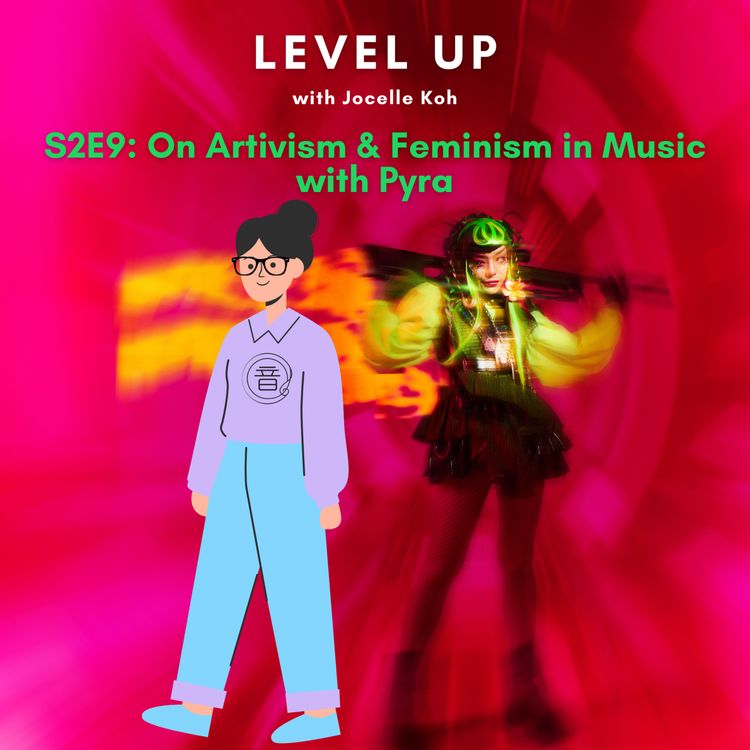
Level Up by Jocelle Koh
Bonus | Interview with Pyra:
We got real with badass artivist/singer-songwriter Pyra about her art, activism, feminism and balancing it all over coconut shakes!
Based now between London and Thailand, we discussed the artivist's colourful musical history, how she got to her current brand of dystopian pop, her brand spanking new album 'PYRADISE' and how she manages themes of activism and feminism within her work.
Pyra starts by sharing about her move to London and the motivations behind her vocal stance on activism, government, and economics. Together we delved into exploring Singapore (where the interview was held) as a "utopian but dystopian" place, particularly challenging for those facing financial struggles, and learned the backstory behind her immersive debut album 'PYRADISE'.
We then shifted our focus to the intersection of feminism and creativity in music, discussing the importance of using music to convey messages about oppression, political issues, and feminism. Pyra also shared with us on the climate for women in Thailand, including the obstacles to achieving gender equality, as well her experiences as a female producer, writer and artist in the wider music industry.
Watch the full video interview on our YouTube channel!
Learn more about Pyra by following her on Instagram and listening to her album 'PYRADISE' on streaming platforms everywhere.
- Subscribe to our Patreon ‘Level Up’ Tier for forthcoming ‘Level Up’ cheat sheets and materials
- Subscribe to our mailing list for access to the first three episodes’ cheat sheets!
- More about the podcast
- Follow us on Instagram or Facebook for Podcast updates
- Hang with us on Asian Pop Weekly
More episodes
View all episodes
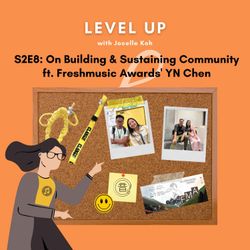
8. Bonus | Interview with Freshmusic Awards' YN Chen: On Building & Sustaining Community
41:32||Season 2, Ep. 8We had the pleasure of attending the Freshmusic awards LIVE for the first time ever last month, and I came away with so much more than I bargained for. Attending the ceremony and many discussions I've had recently around the topic of community inspired me to invite Yuneng, the founder of Freshmusic Awards to join us for this very special conversation where we talked about some of the understated values of community building, and the origins of grassroots platforms like Freshmusic Awards who have been around for 16 years.Yuneng, Freshmusic’s founder was one of my first industry friends I made when I came back to Singapore, and of course I had already long been aware of the work that Freshmusic had been doing with their cutthroat yet expert reviews and annual awards ceremony which made waves in the indie Taiwanese scene every time they announced their nominations and winners. But being a creator of a media platform myself, and also as someone who does this out of passion while managing a day job, I found solace and comfort in the work that Yuneng had been doing because I could see so clearly that it also came from a place of pure unadulterated passion, the kind that sustains, that invigorates, and lasts for decades. So we wanted to unpack this topic thoroughly with someone who knew the topic better than most, leading to this nurturing, uplifting conversation that could warm the cockles of any seasoned music journalist's heart.Subscribe to our Patreon ‘Level Up’ Tier for forthcoming ‘Level Up’ cheat sheets and materialsSubscribe to our mailing list for access to the first three episodes’ cheat sheets!More about the podcastFollow us on Instagram or Facebook for Podcast updatesHang with us on Asian Pop WeeklyA bonus episode produced in commemoration of Asian Pop Weekly's 14th Anniversary in 2023!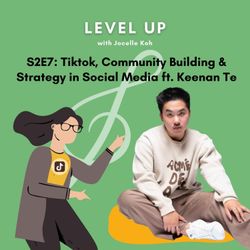
7. Bonus | Interview with Keenan Te: Tiktok, Community Building & Strategy in Social Media
20:59||Season 2, Ep. 7On this bonus episode, we invited Asian-Australian singer-songwriter and Tiktok creator Keenan Te onto the Level Up Podcast to answer all our burning questions about Tiktok, social media, and most importantly - how to navigate social media as a musician. Amassing over 4 million followers currently across Tiktok, Spotify and various social media platforms, Te broke through the clutter during Covid while stuck at home during Melbourne's lengthy lockdowns with his soulful covers and heart-wrenching deliveries. But what was even more interesting for us was how he navigated the transition successfully from cover artist to original singer-songwriter, and maintained and grew his audience while doing so.Back with his new single 'Scars', we took the chance to ask him all our burning questions, and to pick his brain on the changing social media landscape as he sees it. For all budding musicians, this is one episode you won't want to miss.Subscribe to our Patreon ‘Level Up’ Tier for forthcoming ‘Level Up’ cheat sheets and materialsSubscribe to our mailing list for access to the first three episodes’ cheat sheets!More about the podcastFollow us on Instagram or Facebook for Podcast updatesHang with us on Asian Pop WeeklyFollow Keenan on Tiktok or InstagramListen to 'Scars' out on all streaming platforms Don’t forget to subscribe/follow our podcast if you enjoy levelling up with us! And please leave a review so we can keep helping even more artists!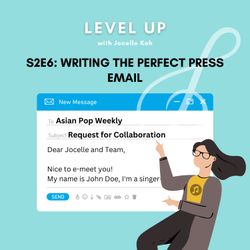
6. PR | Writing The Perfect Press Email
11:58||Season 2, Ep. 6On this episode of the Level Up podcast, we're going to talk about how to craft that perfect email to media platforms. In such a way that you'll be maximising your time spent, getting a higher rate of reply, and potentially getting your foot in the door with the right people. As a self-professed email nerd, and someone who runs a media platform and receives such emails from artists everyday, I'm going to share my best tips for writing effective emails and how to ask nicely but effectively for support. Shall we begin?Links and Resources:Subscribe to our Patreon ‘Level Up’ Tier for forthcoming ‘Level Up’ cheat sheets and materialsSubscribe to our mailing list for access to the first three episodes’ cheat sheets!More about the podcastFollow us on Instagram or Facebook for Podcast updatesHang with us on Asian Pop Weekly Don’t forget to subscribe/follow our podcast if you enjoy levelling up with us! And please leave a review so we can keep helping even more artists!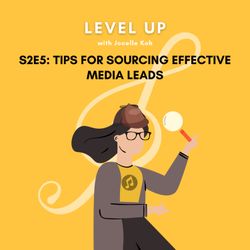
5. PR | Tips for Sourcing Effective Media Leads
11:08||Season 2, Ep. 5This week, we're talking about sourcing for media platforms to reach out to to collaborate with, and what's the best way to really be effective in your approach. I know that there's a lot of independent artists out there who feel like this is very daunting for them. They feel like they need a publicist to help them, like they need someone to help them to negotiate those deals or get those features. But when push comes to shove, sometimes you just don't have the resources at that point in time to get yourself there. It can also become dangerous to hire someone to do something you don't understand, because as an artist entrepreneur, it can be like you're throwing your money into a black hole. So we're here to help you change your mindset about DIY PR!When it comes down to sourcing for media platforms, there's two different approaches, there's the cast your net wide approach and the targeted/quality approach. Today we're going to dive into the targeted and tailored approach to help you easily source more media platforms that are right for you and your media list. Timestamps[00:44] How public relation works in the music industry[02:52] The different approaches to sourcing for media platforms[07:34] Tips to prevent spamming in public relations[08:08] Getting into a new market and succeeding as an individual artistKey takeaways● Public relation is really about the skill of targeting the platforms you are looking for and the way you reach out and communicate with them.● Publicists are not cheap. It’s something that you would invest in when you have a clear idea of your business model and revenue as an artist.Links and Resources:Subscribe to our Patreon ‘Level Up’ Tier for forthcoming ‘Level Up’ cheat sheets and materialsSubscribe to our mailing list for access to the first three episodes’ cheat sheets!More about the podcastFollow us on Instagram or Facebook for Podcast updatesHang with us on Asian Pop Weekly Don’t forget to subscribe/follow our podcast if you enjoy levelling up with us! And please leave a review so we can keep helping even more artists!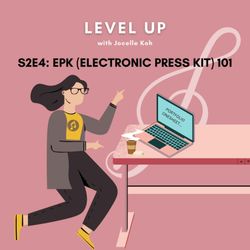
4. PR | EPK (Electronic Press Kit) 101 ft. Make Your Mark
18:58||Season 2, Ep. 4So today, we're going to be talking about best practices for EPKs, otherwise known as Electronic Press Kits for artists. And as someone who works in journalism and distribution, I think this is something that's very important for any independent artist. EPKs are a very important in helping to further your conversation with a third party, no matter if it's with a distribution partner, the DSPS, a media platform, or any other kind of partner. It's be a stepping stone for you to further the conversation with key potential partners. So it's really important to get it right. In collaboration with Make Your Mark, I had the pleasure of sharing my best practices for EPKs with their artists - everything from formulating, to creating, to updating your EPK. We even go a little into how to write your own press release! And now we're here sharing that information with you too! For any indie artists who aren't sure where to start when it comes to creating your EPK, press play and let us do the talking.The full presentation for our 'EPK: Best Practices' session is up on our Patreon! Head over to our 'Level Up Podcast' tier and subscribe for supplementary resources that come with all of our content. FOLLOW US: Spotify: http://bit.ly/LevelUpPodcastSpotifyiTunes: http://bit.ly/LevelUpPodcastiTunesKKBOX: http://bit.ly/LevelUpPodcastKKBOXMORE ABOUT THE PODCAST: http://bit.ly/LevelUpbyJocelleKohSUBSCRIBE TO OUR PATREON: http://bit.ly/LevelUpTierPatreon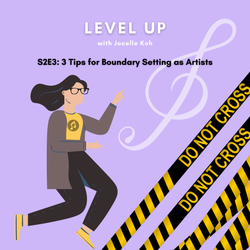
Mental Health | 3 Tips for Boundary Setting as Artists
09:29|Boundaries are a tricky thing for artists. They're subjective, contested, and directly responsible for many an independent artists' mental health. Yet as tricky as they may be, it's a conversation that HAS to be had in order to create a sustainable career as an artist. In this bite-sized episode, we share three tips for how you can create your own roadmap to establishing boundaries with audiences and stakeholders within the industry. Remember always that you too are human-so boundaries apply too-even if you're a public figure. Links and Resources: Subscribe to our Patreon ‘Level Up’ Tier for forthcoming ‘Level Up’ cheat sheets and materials Subscribe to our mailing list for access to the first three episodes’ cheat sheets! More about the podcast Follow us on Instagram or Facebook for Podcast updates Hang with us on Asian Pop Weekly Don’t forget to subscribe/follow our podcast if you enjoy levelling up with us! And please leave a review so we can keep helping even more artists!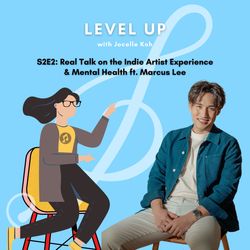
Mental Health | Real Talk on the Indie Artist Experience & Mental Health ft. Marcus Lee
01:09:35|On the first episode of our Level Up podcast in 2022, we've invited Marcus Lee, a promising Singaporean artist, songwriter, and mental health advocate, to join us as we dive deeper into the topic of artists' mental health. We've been a fan of his work ethic and how he's managed to keep the ball rolling as an independent musician for a while now, but we especially wanted to pick his brain on the importance of mental health for artists at every stage of the game. On the outside, Marcus seems to be the perfect poster boy for the local burgeoning Mandopop scene. Blessed with good looks and a sunny warm disposition, his comforting love songs and ballads have proved themselves great additions to our songbooks in recent years. Hence, there's no doubt why he's been labelled an artist to watch, even taking home the 'Artist of the Year (non-English)' award at 2021's SCAPE Youth Music Awards. Yet unlike previous generations of Mandopop stars who have chosen to adhere to the more conventional pop route, Marcus has chosen the path less trodden, choosing to release his debut album For You, I Can 為了你,我可以 independently and helming everything from the album's conceptualisation to its promotion, and even playing two sold-out shows...all during an unprecedented pandemic. Given Marcus' unique position in pulling all this off, and his passionate and vocal stance on mental health, I felt he was the perfect artist to interview as we continue our Mental Health topic on the Level Up Podcast, providing an artist's perspective on the nuanced issues and struggles that creatives face in this particular line of work. Tune in as we discuss topics such as investing in ones' mental health, self doubt in the face of creative competition, and of course the much-feared imposter syndrome all in this week's podcast! Links and Resources: Subscribe to our Patreon ‘Level Up’ Tier for forthcoming ‘Level Up’ cheat sheets and materials Subscribe to our mailing list for access to the first three episodes’ cheat sheets! More about the podcast Follow us on Instagram or Facebook for Podcast updates Hang with us on Asian Pop Weekly Follow Marcus on Instagram or Tiktok! Read our feature based on this podcast interview with Marcus on Asian Pop Weekly Don’t forget to subscribe/follow our podcast if you enjoy levelling up with us! And please leave a review so we can keep helping even more artists!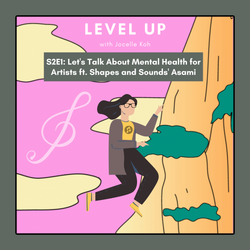
Mental Health | Let's Talk about Mental Health for Artists ft. Shapes and Sounds' Asami
53:22|Mental Health has increasingly become an important topic to me, especially in recent years as I grow more aware of what’s happening in the industry. Due to multiple factors such as the diversity of people you meet in the music industry and the blurred lines between artists as professionals and the art they create, I believe that building a good approach to mental health is one of the most important things independent artists can do for themselves to ensure they make good decisions and build sustainable businesses in the long run. But this is certainly a topic I can’t explore on my own! So I’ve called on the help of Asian-Australian music therapist Asami, who runs a platform called Shapes and Sounds to share her valuable advice with indie artists everywhere. Based in Melbourne, Asami saw a need for different approaches towards tailoring care for people from the Asian diaspora in her previous role working with crisis and community health services; something that current organisations just couldn’t provide. So she created Shapes and Sounds, a resource hub for Asian Australians and Asian diaspora individuals that creates a safe space where tailored conversations around our identity and mental health can occur. Check out some key threads from our conversation below: The origins of Music Therapy A relatively recent vein of therapy, music therapy was invented post WWII in the wards of soldiers coming back from war Patients were comatose and were unresponsive until musicians came into the room to play, and that’s when there would be some emotional responses/releases Relationship between music and PTSD therapy was uncovered The relationship between music and our worldviews Asami believes music is the thing that helps us to understand the world Especially for youth, music is an important influence Due to an increasing secularisation, we turn to music to fulfil the needs to shape our identities Music has always been used to help people come together in times where words aren’t quite enough How does music specifically assist in trauma therapy? Your language centres turn off, disallowing us from talking about it Engaging in music expression allows a different part of your brain to light up Sharing music also allows people to explain how they’re feeling and start much-needed conversations Listening to music helps to regulate your nervous system through your heartbeat and breathing When you listen to music in the presence of others, you’re co-regulating Co-regulating means you’re being present with another human being and can help things feel calmer Music is a way to facilitate therapeutic conversations in a safe environment Asian culture and mental health 16% of Australian population are Asian, yet this population is often made to feel invisible in day to day routines, institutions and structures Asian individuals tend to deal with things quietly and silently due to not having opportunities to talk openly about stress Asami has noticed that Asian individuals have a tendency to persevere silently Perfectionism and over-achievement is a big part of our culture and causes trauma in Asian-Australians Intergenerational trauma from previous generations also makes up a big part of the trauma Asian Australians face Our Confucianist values have deeply influenced the way Asian individuals approach trauma Advice for Asian/Asian diaspora artists in handling specific challenges Financial Stress Try not to blame yourself for this external factor While it’s good to not do things for the money, be clear about the budgeting and how much you nee